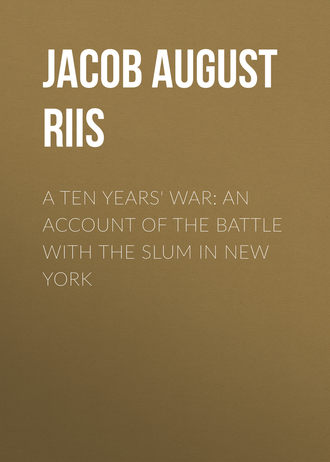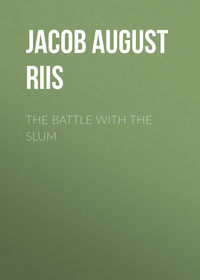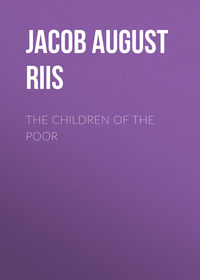 полная версия
полная версияA Ten Years' War: An Account of the Battle with the Slum in New York
There lies upon my table a copy of the minutes of the Board of Education of January 9, 1895, in which is underscored a report on a primary school in the Bronx. "It is a wooden shanty," is the inspector's account, "heated by stoves, and is a regular tinder box; cellar wet, and under one class-room only. This building was erected in order, I believe, to determine whether or not there was a school population in the neighborhood to warrant the purchase of property to erect a school on."
That was the way then of taking a school census, and the result was the utter failure of the compulsory education law to compel anything. To-day we have a biennial census, ordained by law, which, when at last it gets into the hands of some one who can count, will tell us how many Jacob Beresheims are drifting upon the shoals of the street. And we have a truant school to keep them safe in. To it, says the law, no thief shall be committed. It is not yet five years since the burglar and the truant—who, having been refused admission to the school because there was not room for him, inconsequently was locked up for contracting idle ways—were herded in the Juvenile Asylum, and classified there in squads of those who were four feet, four feet seven, and over four feet seven! I am afraid I scandalized some good people, during the fight for decency in this matter, by insisting that it ought to be considered a good mark for Jacob that he despised such schools as were provided for him. But it was true. Except for the risk of the burglar, the jail was preferable by far. A woman has now had charge of the truant school for fourteen months, and she tells me that of quite twenty-five hundred boys scarce sixty were rightly called incorrigible, and even these a little longer and tighter grip would probably win over. For such, a farm school is yet to be provided. The rest responded promptly to an appeal to their pride. She "made it a personal matter" with each of them, and the truant vanished; the boy was restored. The burglar, too, made it a personal matter in the old contact, and the result was two burglars for one. In common with nearly all those who have paid attention to this matter, Mrs. Alger believes that the truant school strikes at the root of the problem of juvenile crime. After thirty years of close acquaintance with the child population of London, Mr. Andrew Drew, chairman of the Industrial Committee of the School Board, declared his conviction that "truancy is to be credited with nearly the whole of our juvenile criminality." But for years there seemed to be no way of convincing the New York School Board that the two had anything to do with each other. As executive officer of the Good Government Clubs, I fought that fight to a finish. We got the school, and in Mrs. Alger, at the time a truant officer, a person singularly well qualified to take charge of it. She has recently been removed, that her place might be given to a man. It is the old scheme come back,—a voter behind the broom,—and the old slough waiting to overwhelm us again.
But it will not get the chance. I have my own idea of how this truancy question is going to be solved. Yesterday I went with Superintendent Snyder through some of the new schools he is building, upon what he calls the letter H plan, in the crowded districts. It is the plan of the Hôtel de Cluny in Paris, and to my mind as nearly perfect as it is possible to make a schoolhouse. There is not a dark corner in the whole structure, from the splendid gymnasium under the red-tiled roof to the indoor playground on the ground floor, which, when thrown in one with the two open-air playgrounds that lie embraced in the arms of the H, will give the children nearly an acre of asphalted floor space from street to street, to romp on. Seven such schools are going up to-day, each a beautiful palace, and within the year sixteen thousand children will be housed in them. When I think of the old Allen Street school, where the gas had to be kept burning even on the brightest days, recitations suspended every half hour, and the children made to practice calisthenics so that they should not catch cold while the windows were opened to let in fresh air; of the dark playground downstairs, with the rats keeping up such a racket that one could hardly hear himself speak at times, or of the other East Side playground where the boys "weren't allowed to speak above a whisper," so as not to disturb those studying overhead, I fancy that I can make out both the cause and the cure of the boy's desperation. "We try to make our schools pleasant enough to hold the children," wrote the Superintendent of Schools in Indianapolis to me once, and added that they had no truant problem worth bothering about. With the kindergarten and manual training firmly engrafted upon the school course, as they are at last, and with it reaching out to enlist also the boy's play through playground and vacation schools, I shall be willing to turn the boy, who will not come in, over to the reformatory. They will not need to build a new wing to the jail for his safe-keeping.
All ways lead to Rome. The reform in school-building dates back, as does every other reform in New York, to the Mulberry Bend. It began there. The first school that departed from the soulless old tradition, to set beautiful pictures before the child's mind as well as dry figures on the slate, was built there. At the time I wanted it to stand in the park, hoping so to hasten the laying out of that; but although the Small Parks law expressly permitted the erection on park property of buildings for "the instruction of the people," the officials upon whom I pressed my scheme could not be made to understand that as including schools. Perhaps they were right. I catechised thirty-one Fourth Ward girls in a sewing school, about that time, twenty-six of whom had attended the public schools of the district more than a year. One wore a badge earned for excellence in her studies. In those days every street corner was placarded with big posters of Napoleon on a white horse riding through fire and smoke. There was one right across the street. Yet only one of the thirty-one knew who Napoleon was. She "thought she had heard of the gentleman before." It came out that the one impression she retained of what she had heard was that "the gentleman" had two wives. They knew of Washington that he was the first President of the United States, and cut down a cherry-tree. They were sitting and sewing at the time almost on the identical spot where he lived and held office. To the question who ruled before Washington the answer came promptly: no one; he was the first. They agreed reluctantly, upon further consideration, that there was probably "a King of America" before his day, and the Irish damsels turned up their noses at the idea. The people of Canada, they thought, were copper-colored. The same winter I was indignantly bidden to depart from a school in the Fourth Ward by a trustee who had heard that I had written a book about the slum and spoken of "his people" in it.
Those early steps in the reform path stumbled sadly at times over obstacles that showed how dense was the ignorance and how rank were the prejudices we had to fight. When I wrote that the Allen Street school was overrun by rats, which was a fact any one might observe for himself by spending five minutes in the building, I was called sharply to account by the Mayor in the Board of Estimate and Apportionment. There were no rats, he said. The Allen Street school was the worst of them all, and I determined that the time had come to make a demonstration. I procured a rat trap, and was waiting for an idle hour to go over and catch one of the rats, so that I might have it stuffed and sent to the board over which the Mayor presided, as a convincing exhibit; but before I got so far reform swept the whole conspiracy of ignorance and jobbery out of the City Hall.
That was well enough as far as it went; but that the broom was needed elsewhere we learned later, when the Good Government Clubs fought for the inspection of the schools and of the children by trained oculists. The evidence was that the pupils were made both near-sighted and stupid by the want of proper arrangement of their seats and of themselves in the class-room. The fact was not denied, and the scheme was strongly indorsed by the Board of Health and by some of the ablest and best known oculists in the city; but it was wrecked upon an opposition in which we heard the ignorant and selfish cry that it would "interfere with private practice," and so curtail the profits of the practitioner. The proposal to inspect the classes daily for evidence of contagious disease—which, carried out, has proved a most effective means of preventing the spread of epidemics, and one of the greatest blessings—had been opposed, happily unsuccessfully, with the same arguments.6 It is very well to prate about the rapacity of politicians, but these things came often enough to show what they meant by the claim that they were "closer to the people" than we who were trying to help them; and they were all the more exasperating because they came rarely from below,—the tenement people, when they were not deliberately misled, were ready and eager to fall in with any plan for bettering things, notably where it concerned the schools,—but usually from those who knew better, and from whom we had a right to expect support and backing.
Speaking of that reminds me of a mishap I had in the Hester Street school,—the one with the "frills" which the Board of Education cut off. I happened to pass it after school hours, and went in to see what sort of a playground the roof would have made. I met no one on the way, and, finding the scuttle open, climbed out and up the slant of the roof to the peak, where I sat musing over our lost chance, when the janitor came to close up. He must have thought I was a crazy man, and my explanation did not make it any better. He haled me down, and but for the fortunate chance that the policeman on the beat knew me, I should have been taken to the lockup as a dangerous lunatic,—all for dreaming of a playground on the roof of a schoolhouse.
Janitor and Board of Commissioners to the contrary notwithstanding, the dream became real. There stands another school in Hester Street to-day within easy call, that has a playground measuring more than twelve thousand square feet on the roof, one of half that size down on the ground, and an asphalted indoor playground as big as the one on the roof. Together they measure a trifle less than thirty thousand feet. To the indignant amazement of my captor, the janitor, his school was thrown open to the children in the last summer vacation, and in the winter they put a boys' club in to worry him. What further indignities there are in store for him, in this day of "frills," there is no telling. A resolution is on record which states, under date of May 18, 1897, that "it is the sense of the Board of Superintendents that the schoolhouses may well be used in the cause of education as neighborhood centres, providing reading-rooms, branch offices of public libraries, etc." And to cut off all chance of relapse into the old doubt whether "such things are educational," that laid so many of our hopes on the dusty shelf of the circumlocution office, the state legislature has expressly declared that the commonwealth will take the chance, which Boards of Education shunned, of a little amusement creeping in. The schools may be used for "purposes of recreation." To the janitor it must seem that the end of all things is at hand.
In the crowded districts, the school playgrounds were thrown open to the children during the long vacation last year, with kindergarten teachers to amuse them, and half a score of vacation schools tempted more than four thousand children from the street into the cool shade of the class-rooms. They wrought in wood and iron, they sang and they played and studied nature,—out of a barrel, to be sure, that came twice a week from Long Island filled with "specimens;" but toward the end we took a hint from Chicago, and let the children gather their own specimens on excursions around the bay and suburbs of the city. That was a tremendous success. The mere hint that money might be lacking to pay for the excursions this summer set the St. Andrew's Brotherhood men on Long Island to devising schemes for inviting the schoolchildren out on trolley and shore trips. With the Christian Endeavor, the Epworth League, and kindred societies looking about for something to try their young strength and enthusiasm on, we may be here standing upon the threshold of something which shall bring us nearer to a universal brotherhood than all the consecrations and badges that have yet been invented.
The mere contact with nature, even out of a barrel, brought something to those starved child lives that struck a new note. Sometimes it rang with a sharp and jarring sound. The boys in the Hester Street school could not be made to take an interest in the lesson on wheat until the teacher came to the effect of drought and a bad year on the farmer's pocket. Then they understood. They knew the process. Strikes cut into the earnings of Hester Street, small enough at the best of times, at frequent intervals, and the boys need not be told what a bad year means. No other kind ever occurs there. They learned the lesson on wheat in no time, after that. Oftener it was a gentler note that piped timidly in the strange place. A barrel of wild roses came one day, instead of the expected "specimens," and these were given to the children. They took them greedily. "I wondered," said the teacher, "if it was more love of the flower, or of getting something for nothing, no matter what." But even if it were largely the latter, there was still the rose. Nothing like it had come that way before, and without a doubt it taught its own lesson. The Italian child might have jumped for it more eagerly, but its beauty was not wasted in Jew-town, either. The baby kissed it, and it lay upon more than one wan cheek, and whispered who knows what thought of hope and courage that were nearly gone. Even in Hester Street the wild rose from the hedge was not wasted.
The result of it all was wholesome and good, because it was common sense. The way to fight the slum in the children's lives is with sunlight and flowers and play, which their child hearts crave, if their eyes have never seen them. The teachers reported that the boys were easier to manage, more quiet, and played more fairly than before. The police reports showed that fewer were arrested or run over in the streets than in other years. A worse enemy was attacked than the trolley car or the truck. In the kindergarten at the Hull House in Chicago there hangs a picture of a harvest scene, with the man wiping his brow, and a woman resting at his feet. The teacher told me that a little girl with an old face picked it out among all the rest, and considered it long and gravely. "Well," she said, when her inspection was finished, "he knocked her down, didn't he?" A two hours' argument for kindergartens or vacation schools could not have put it stronger or better.
The awakening of the civic conscience is nowhere more plainly traced than in our public schools. The last five years have set us fifty years ahead, and there is now no doubling on the track we have struck. We have fifty kindergartens to-day where five years ago we had one, and their method has invaded the whole system of teaching. Cooking, the only kind of temperance preaching that counts for anything in a school course, is taught in the girls' classes. Five years ago a minister of justice declared in the Belgian Chamber that the nation was reverting to a new form of barbarism, which he described by the term "alcoholic barbarism," and pointed out as its first cause the "insufficiency of the food procurable by the working classes." He referred to the quality, not the quantity. The United States experts, who lately made a study of the living habits of the poor in New York, spoke of it as a common observation that "a not inconsiderable amount of the prevalent intemperance can be traced to poor food and unattractive home tables." The toasting-fork in Jacob's sister's hand beats preaching in the campaign against the saloon, just as the boys' club beats the police club in fighting the gang.
The cram and the jam are being crowded out as common-sense teaching steps in and takes their place, and the "three H's," the head, the heart, and the hand,—a whole boy,—are taking the place too long monopolized by the "three R's." There was need of it. It had seemed sometimes as if, in our anxiety lest he should not get enough, we were in danger of stuffing the boy to the point of making a hopeless dunce of him. It is a higher function of the school to teach principles than to impart facts merely. Teaching the boy municipal politics and a thousand things to make a good citizen of him, instead of so filling him with love of his country and pride in its traditions that he is bound to take the right stand when the time comes, is as though one were to attempt to put all the law of the state into its constitution to make it more binding. The result would be hopeless congestion and general uselessness.
It comes down to the teacher in the end, and there are 5600 of them in the old city alone, 10,000 for the greater city;7 the great mass faithful and zealous, but yoked to the traditions of a day that is past. Half the machine teaching, the wooden output of our public schools in the past, I believe was due to the practical isolation of the teachers between the tyranny of politics and the distrust of those who had good cause to fear the politician and his work. There was never a more saddening sight than that of the teachers standing together in an almost solid body to resist reform of the school system as an attack upon them. There was no pretense on their part that the schools did not need reform. They knew better. They fought for their places. Throughout the fight no word came from them of the children's rights. They imagined that theirs were in danger, and they had no thought for anything else. We gathered then the ripe fruit of politics, and it will be a long while, I suppose, before we get the taste out of our mouths. But the grip of politics on our schools has been loosened, if not shaken off altogether, and the teacher's slavery is at an end, if she herself so wills it. Once hardly thought worthy of a day laborer's hire, she will receive a policeman's pay for faithful service8 in the school year now begun, with his privilege of a half-pay pension on retirement. Within three weeks after the passage of the salary bill forty-two teachers in the boroughs of Manhattan and Bronx had applied for retirement. The training schools are hard at work filling up the gaps. The windows of the schoolhouse have been thrown open, and life let in there too with the sunlight. The day may be not far distant when ours shall be schools "for discovering aptitude," in Professor Felix Adler's wise plan. The problem is a vast one, even in its bulk; every year seats must be found on the school benches for twenty thousand additional children. However deep we have gone down into our pockets to pay for new schools, there are to-day in the greater city nearly thirty thousand children in half-day or part-time classes, waiting their chance. But that it can and will be solved the experience of the last five years fully warrants.
In the solution the women of New York will have had no mean share. In the struggle for school reform they struck the telling blows, and the credit for the victory was justly theirs. The Public Education Association, originally a woman's auxiliary to Good Government Club E, has since worked as energetically with the school authorities as it before worked against them. It has opened many windows for little souls by hanging schoolrooms with beautiful casts and pictures, and forged at the same time new and strong links in the chain that bound the boy all too feebly to the school. At a time when the demand of the boys of the East Side for club room, which was in itself one of the healthiest signs of the day, had reached an exceedingly dangerous pass, the Public Education Association broke ground that will prove the most fertile field of all. The Raines law saloon, quick to discern in the new demand the gap that would divorce it by and by from the man, attempted to bridge it by inviting the boy in under its roof. Occasionally the girl went along. A typical instance of how the scheme worked was brought to my attention at the time by the manager of the College Settlement. The back room of the saloon was given to the club free of charge, with the understanding that the boy members should "treat." As a means of raising the needed funds, the club hit upon the plan of fining members ten cents when they "got funny." To defeat this device of the devil some way must be found; but club room was scarce among the tenements. The Good Government Clubs proposed to the Board of Education that it open the empty class-rooms at night for the children's use. It was my privilege to plead their cause before the School Board, and to obtain from it the necessary permission, after some hesitation and doubt as to whether "it was educational." The Public Education Association promptly assumed the responsibility for "the property," and the Hester Street school was opened. There are now two schools that are given over to evening clubs. The property has not been molested, but the boys who have met under Miss Winifred Buck's management have learned many a lesson of self-control and practical wisdom that has proved "educational" in the highest degree. Her plan is simplicity itself. Through their play—the meeting usually begins with a romp—in quarters where there is not too much elbow-room, the boys learn the first lesson of respecting one another's rights. The subsequent business meeting puts them upon the fundamentals of civilized society, as it were. Out of the debate of the question, Do we want boys who swear, steal, gamble, and smoke cigarettes? grow convictions as to why these vices are wrong that put "the gang" in its proper light. Punishment comes to appear, when administered by the boys themselves, a natural consequence of law-breaking, in defense of society; and the boy is won. He can thenceforward be trusted to work out his own salvation. If he does it occasionally with excessive unction, remember how recent is his conversion. "Resolved, that wisdom is better than wealth," was rejected as a topic for discussion by one of the clubs, because "everybody knows it is." This was in the Tenth Ward. If temptation had come that way in the shape of a pushcart with pineapples—we are all human! Anyway, they had learned the right.
With the women to lead, the school has even turned the tables on the jail and invaded it bodily. For now nearly two years the Public Education Association has kept school in the Tombs, for the boys locked up there awaiting trial. Of thirty-one pupils on this school register, the other day, twelve were charged with burglary, four with highway robbery, and three with murder. That was the gang run to earth at last. Better late than never. The windows of their prison overlooked the spot where the gallows used to stand that cut short many a career such as they pursued. They were soberly attentive to their studies, which were of a severely practical turn. Their teacher, Mr. David Willard, who was a resident of the University Settlement in its old Delancey Street home,—the fact that the forces for good one finds at work in the slum usually lead back to the settlements shows best that they have so far escaped the peril of stiffening into mere institutions,—has his own sound view of how to head off the hangman. Daily and nightly he gathers about him in the house on Chrystie Street, where he makes his home, three hundred boys and girls, whom he meets as their friend, on equal terms. The club is the means of getting them there, and so it is in its right place.
Once a week another teacher comes to the Tombs school, and tells the boys of our city's history, its famous buildings and great men; trying so to arouse their interest as a first step toward a citizen's pride. This one also is sent by a club of women, the City History Club, which in three years has done strange things among the children. It sprang from the proposition of Mr. Robert Abbe that the man and the citizen has his birth in the boy, and that to love a thing one must know it first. The half-dozen classes that were started for the study of our city's history have swelled into nearly a hundred, with quite eighteen hundred pupils. The pregnant fact was noted early by the teachers, that the immigrant boy easily outstrips in interest for his adopted home the native, who perchance turns up his nose at him, and later very likely complains of the "unscrupulousness" of the Jew who forged ahead of him in business as well.









